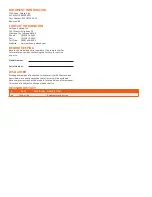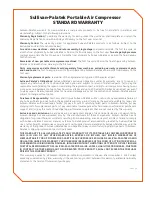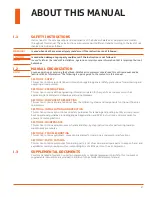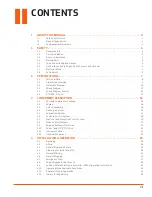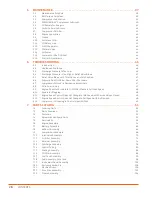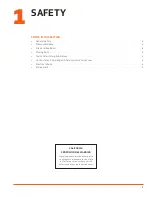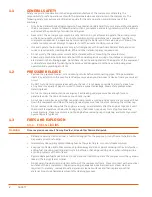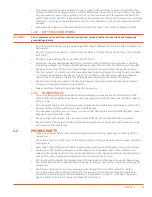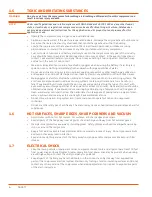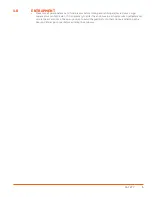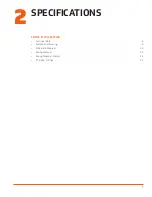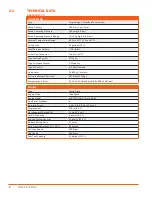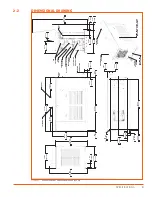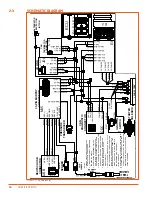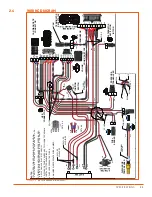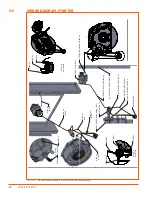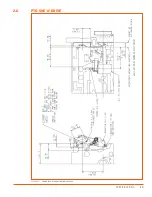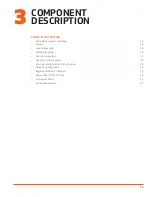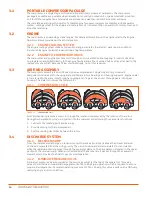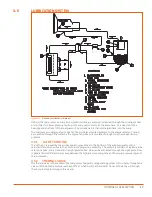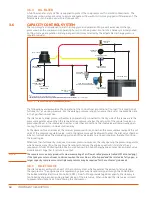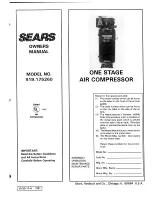
3
SaFETy
»
Anti-freeze compound used in airline anti-icing systems contains methanol, which is flammable. use
systems and refill with compound only in well-ventilated areas, away from heat, open flames, or sparks.
Do not expose any part of these systems or the anti-freeze compound to temperatures above 150°F
(65°C). Vapors from the anti-freeze compound are heavier than air. Do not store compound or discharge
treated air in confined or unventilated area. Do not store containers or anti-freeze compound in direct
sunlight.
»
Store flammable liquids in suitable containers and cabinets, away from sources of sparks and heat.
1.3.2 BATTERIES AND WIRING
WARNING!
Fire or explosion can result from electrical arcing from terminal, battery connections and improperly
grounded equipment.
»
Do NoT check the battery charge by placing a metal object between the terminals. use a voltmeter or a
hydrometer.
»
Do NoT charge a frozen battery. There is risk of explosion. If the battery is frozen, heat it up to at least
61°F (16°C).
»
Do NoT charge a battery that is in excess of 113°F (45°C).
»
Disconnect the grounded (negative) battery connection prior to attempting any repairs or cleaning
inside the enclosure. Tag the ground cable with a warning not to reconnect until servicing is complete.
»
Keep electrical wiring, battery terminals and other terminals in good condition. Replace any wiring
that has cracked, cut, abraded, or otherwise degraded insulation. Replace terminals if worn, discolored
or corroded. Keep all terminals clean and tight. Turn off battery charger before making or breaking
connections to the battery. Wear a face shield whenever servicing or working on the battery.
»
Keep tools and other grounded conductive objects away from exposed live electrical parts to avoid
arcing, which might serve as a source of ignition.
»
Always avoid electrical parts when washing the compressor.
1.3.3 COMBUSTIBLES
»
Prior to welding or making weld repairs on the compressor, remove any acoustical material or other
material that may be damaged by heat or that may support combustion. Remove and isolate negative
battery cable.
»
Do not operate compressor under low overhanging leaves or permit leaves and foliage to contact hot
exhaust system surfaces when operating in forested areas.
»
Do not expose dry grass, grass cuttings, oil, or any other flammable material to exhaust gases. Always
keep the engine and muffler clean.
»
Keep oily rags, trash, leaves, litter, or other combustibles out of and away from the compressor.
»
Keep a suitable fully charged class bC or AbC fire extinguisher or extinguishers nearby when servicing
and operating the compressor.
1.4
MOVING PARTS
»
Make sure all personnel are clear of the compressor prior to starting, operating, or shutting off the
compressor.
»
Keep hands, arms, and other parts of the body, as well as clothing, away from belts, pulleys, and other
moving parts.
»
Wear snug fitting clothing and confine long hair when working around compressors or any machinery.
»
Avoid slips and falls when working around the compressor. Keep hands, feet, floors, controls, and
walking surfaces clean and free of oil, water, anti-freeze, or other liquids to minimize the possibility of
slips or falls. use extreme caution when ground is covered with ice or snow.
»
Do not attempt to operate the compressor with the fan guard or other guards removed. Keep access
doors closed except when repairing, adjusting or performing service, or when starting or stopping the
compressor.
»
Shut down engine before servicing, especially when adding fuel, oil, coolant, lubricants, airline
anti-freeze compound, or battery electrolyte. The engine must also be shut down before making
adjustments. Restart engine to check adjustment. If adjustment is incorrect, shut down the engine
again, readjust, then restart engine to recheck the adjustment.
Summary of Contents for D260UJD4PTOW
Page 4: ......
Page 6: ...vi About This Manual ...
Page 14: ...6 Safety ...
Page 21: ...13 Specifications 2 6 PTO SAE A DRIVE Figure 2 5 Power Take Off Auxiliary Drive Specs ...
Page 22: ...14 Specifications ...
Page 32: ...24 Component Description ...
Page 44: ...36 Installation and Operation ...
Page 58: ...50 Troubleshooting ...
Page 125: ...117 Parts Catalog ...
Page 134: ...NOTES ...
Page 135: ...NOTES ...


